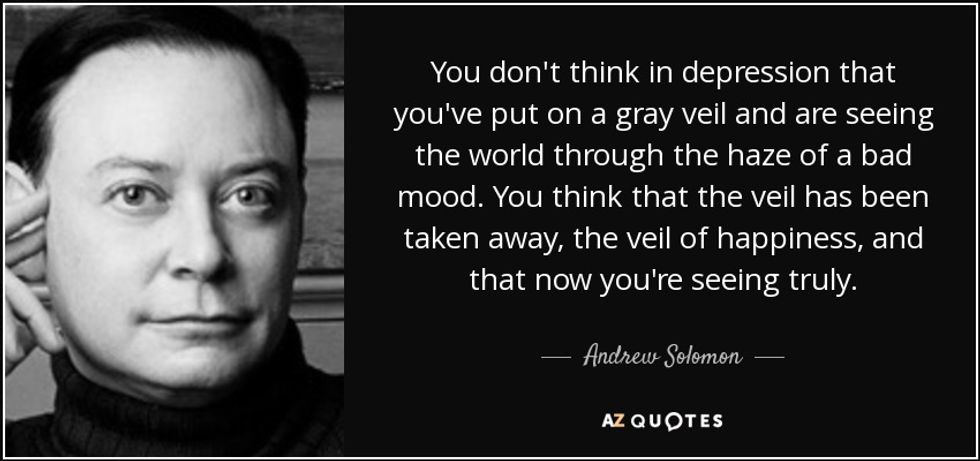In the classical traditions of art, works such as Goya's Colossus painting and Dickinson's Funeral in My Brain poem, have treated the subject of depression with the gravitas it deserves. The works inspire images of singularly monolith intensity, a great pillar that seems to come down from the sky and stamp itself into the ground, instantaneously establishing itself and yet feeling like it has loomed large since time immemorial. Forever fleeting, yet immediately immortal.
(Goya's Colossus).
Andrew Solomon, an activist who also writes and blogs exclusively about mental health issues, in his TED talk "Depression: The Secret We Share", one that I wholeheartedly recommend to anyone wanting more information about depression, very accurately describes depression as "the opposite of vitality."
The photo below contains another quote from the talk:
(Interesting aside: he looks a bit like Sheldon Cooper from The Big Bang Theory, and to some degree, talks like him as well, although with more elan and erudition as compared to the intelligent and sometimes gleefully oblivious sarcasm we come to know and love from Sheldon).
If the opposite of vitality is somehow regarded as a beautiful kind of pain, and somehow makes people with it more vivacious in some proxy, workaround manner, then I want none of that label to exist anymore. No. This misplaced beautification of what are physically serious yet intangible demons should not even be a phenomenon worth considering, but there we are.
In the grunge movement, born in Seattle, which had its heyday in the 1990s, but whose bands still enjoy album sales and continued support from dedicated fans - there is this myth, the archetype of the tragically sad and broken lead singer, who uses a combination of his demons and a cigarette or alcohol habit - one would be right to consider Layne Staley from Alice in Chains and Kurt Cobain from Nirvana in this unfortunate category - to deliver radically different music, and music that resonates to this day, laced with some mordancy in the lyrics dealing with addiction and personal failure and so on.
While the life of celebrity is often subject to scrutiny irrespective of natural death or not, grunge and its subculture - flannel shirts, long curly hair and a five o clock shadow from six weeks prior - did become unreasonably fashionable to the point of self contradiction and an almost dangerous irrelevancy, something that now unfortunately seems to hold true for mental health. It is "in", it's "cool".
Facetiously ironic and fatuously tone deaf, considering that depression and suicide as brought about among teens is often attributed to them being bullied because those kids were not "in" or "cool" at school. *pointed sideways glance at something that starts with "13" and ends with "Why"*. Robin Williams, the funniest man in the world at one point, killed himself because of his depression. He made everyone who knew his work laugh uncontrollably, but he fought real sadness. If someone of his stature couldn't cope, then there doesn't seem to be any hope for us lesser mortals, although family, friends and personal ambitions are great motivators. If for nothing else, then at the very least for these things, people should hold on. Letting go is not an option, but they may switch hands every once in a while if they feel tired. There comes a time for death in this life, and if possible, one should attempt to live every day to the fullest until then.
A bit of mathematical perspective. A 100 year lifespan will just have 36,500 days in it (365x100). Put it that way, and life as such seems to be pitifully short, although Milton said in Paradise Lost, that seminal work that “The mind is its own place, and in itself can make a heaven of hell, a hell of heaven”, and this warping effect that anxiety, depression and a whole host of other mental illnesses can have on a mind are not at all a fashionable thing to pursue or pretend to have. The extent to which it may or may not manifest externally is not something that should be shamed or dismissed as a triviality either, because for some people silence is a coping mechanism, and for some it is not.
Too long; didn't read version:
While the fact that mental illness is now being spoken about now more than ever before is a good thing, it is probably the last thing in the world that should be sensationalized and made into a movement.





















